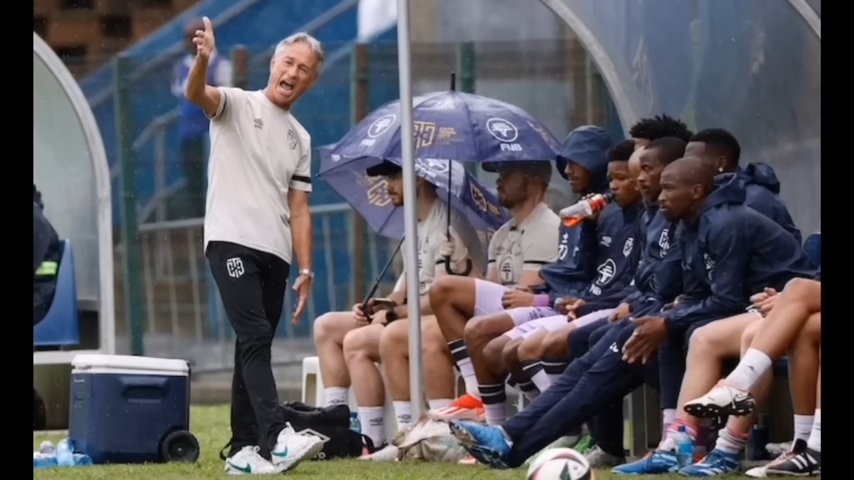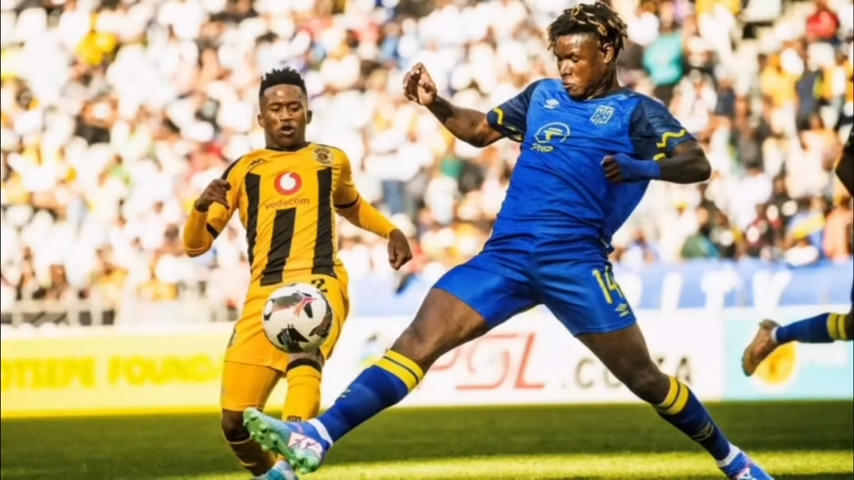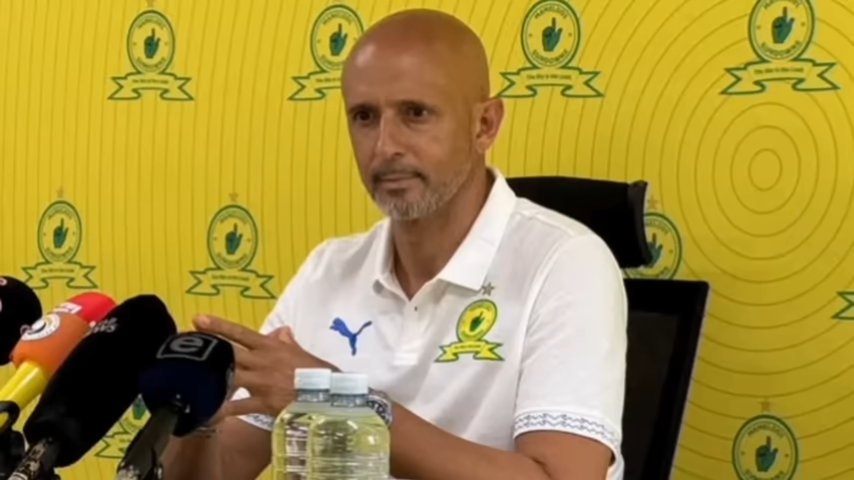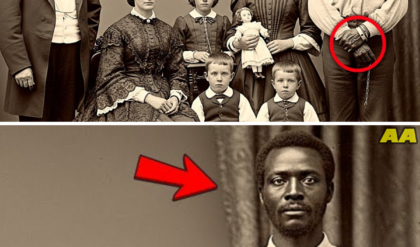The Rise and Fall of Coach Nabi: A Tale of Ambition and Heartbreak

In the bustling city of Johannesburg, where the passion for football runs deep, the Kaizer Chiefs were once a symbol of excellence.
For years, they dominated the South African football scene, their yellow and black colors striking fear into the hearts of opponents.
But as the seasons changed, so did the fortunes of the club.
The fans, known for their unwavering loyalty, began to feel the weight of disappointment as their beloved team struggled to reclaim its former glory.
Enter Nabi, the ambitious new head coach who was brought in with high hopes and expectations.
He arrived with a reputation for turning struggling teams around, and the management believed he was the key to revitalizing the Chiefs.
However, the road ahead was fraught with challenges.
From the moment he stepped onto the training ground, Nabi faced skepticism from both fans and players alike.
“Who is this guy?” some whispered, their doubts palpable.
Despite his credentials, Nabi quickly realized that winning over the hearts of the Kaizer Chiefs supporters would be no easy feat.
He was determined to prove himself, but the pressure to deliver results weighed heavily on his shoulders.

As the season progressed, Nabi found himself in a whirlwind of mixed results.
One week, the team would shine, showcasing brilliant teamwork and skill, while the next, they would falter, leaving fans frustrated and disillusioned.
“Why does he keep changing the starting lineup?” they complained, their voices echoing through the stands.
The inconsistency became a source of contention, and whispers of discontent grew louder.
Despite the challenges, Nabi remained steadfast in his vision.
He believed in the potential of his players and was determined to mold them into a cohesive unit.
“I need time,” he often reminded the media, hoping to quell the growing unrest.
But time was a luxury that the fans were unwilling to grant.
In the heart of the season, the Kaizer Chiefs faced their fiercest rivals, the Orlando Pirates.
The anticipation for the match was electric, with fans eagerly awaiting a chance to see their team triumph.
Nabi knew that this game could make or break his tenure.
“If we win this, it will boost our confidence,” he told his players, instilling a sense of urgency and determination.
The day of the match arrived, and the stadium was packed with thousands of roaring fans.
As the game unfolded, it was a fierce battle, with both teams giving their all.
But as the clock ticked down, the Chiefs found themselves trailing.
In a desperate bid to turn the tide, Nabi made a bold decision to substitute a key player, a move that left many scratching their heads.

“Why would he do that?” the fans murmured, frustration mounting.
The decision backfired, and the Chiefs lost the match, deepening the rift between Nabi and the supporters.
In the aftermath, social media exploded with criticism, and the hashtag #NabiOut began to trend.
The atmosphere was tense, and the pressure on Nabi intensified.
Days turned into weeks, and the situation continued to deteriorate.
Despite his best efforts, the team struggled to find their rhythm, and the fans grew increasingly impatient.
“Give him time,” some pleaded, while others demanded immediate action.
Nabi felt like he was caught in a storm, battling not only the challenges on the pitch but also the mounting criticism off it.
In a desperate attempt to turn things around, Nabi sought advice from experienced coaches, hoping to glean insights that could help him navigate the tumultuous waters.
He reached out to Jose Riviero, a renowned coach who had found success with rival teams.
“Learn from the best,” he thought, eager to absorb any knowledge that could help him lead the Chiefs back to glory.

But as the weeks passed, the situation became untenable.
The management, pressured by the fans and media, began to question Nabi’s ability to lead the team.
“Perhaps it’s time for a change,” they murmured, contemplating the unthinkable.
Then came the fateful day when the club officially announced that they had parted ways with Nabi.
The news sent shockwaves through the football community.
“How could they do this?” many fans exclaimed, torn between their loyalty to the club and their support for the coach.
Nabi had poured his heart and soul into the team, and the abrupt termination felt like a betrayal.
“I gave everything for this club,” he reflected, a mix of disappointment and heartbreak washing over him.
In the days that followed, Nabi found himself grappling with the fallout.
He received messages of support from a handful of loyal fans who believed in his vision.
“Don’t lose hope, Coach,” one message read.
“You have the talent to succeed elsewhere.
”
But the sting of failure lingered, and Nabi couldn’t shake the feeling of inadequacy.
Meanwhile, the Kaizer Chiefs were left to pick up the pieces.
The management scrambled to find a replacement, and the fans anxiously awaited news of the next chapter.
“Who can save us now?” they wondered, their hopes pinned on the next appointment.
The atmosphere was charged with uncertainty, and the future of the club hung in the balance.
As the dust settled, Nabi took time to reflect on his journey.
He realized that while the experience had been painful, it had also taught him invaluable lessons about resilience and determination.
“I will rise again,” he vowed, channeling his energy into self-improvement.
He began to study the intricacies of South African football, determined to understand the culture and dynamics of the game.
Months passed, and Nabi found himself at a crossroads.
He could either dwell on the past or embrace the opportunity for growth.
With a renewed sense of purpose, he began to explore coaching opportunities abroad, eager to prove himself in a new environment.
“I will not be defined by this setback,” he promised himself, setting his sights on a brighter future.

Meanwhile, the Kaizer Chiefs hired a new coach, hoping to turn their fortunes around.
But the transition was anything but smooth.
The new coach faced similar challenges, and the fans’ frustrations resurfaced.
“Maybe we should have given Nabi more time,” some began to whisper, reflecting on the tumultuous season.
As Nabi embarked on his journey abroad, he encountered a new world of football.
He immersed himself in different coaching philosophies and strategies, eager to expand his knowledge.
The experience reignited his passion for the game, and he began to see football not just as a sport but as an art form.
“I want to create something beautiful,” he thought, envisioning a future where he could lead a team to success.
In a twist of fate, Nabi received an offer from a club in Europe.
It was a chance to start anew, to leave behind the shadows of his past.
“I’m ready for this challenge,” he declared, embracing the opportunity with open arms.
As he packed his bags and prepared for the next chapter, he felt a sense of excitement and hope.
Back in South Africa, the Kaizer Chiefs continued to struggle.
The fans began to reflect on the past, realizing that perhaps they had underestimated Nabi’s potential.
“Maybe we should have supported him more,” they lamented, recognizing the talent that had been lost.
The echoes of their discontent lingered, but the reality was clear: the club needed to find its identity once again.
As Nabi settled into his new role in Europe, he poured everything into his coaching.
He embraced the challenges and celebrated the victories, determined to make a name for himself.
With each passing game, he grew more confident, and soon, his team began to flourish under his guidance.
“I am finally where I belong,” he thought, relishing the feeling of success.
Meanwhile, the Kaizer Chiefs faced a pivotal moment in their history.
The management recognized the need for change and began to rebuild the team from the ground up.
They focused on scouting young talent and fostering a culture of unity and resilience.
“Together, we can rise again,” the new coach proclaimed, inspiring hope among the fans.
As the seasons changed, both Nabi and the Kaizer Chiefs embarked on their respective journeys of growth and reinvention.
Nabi became a respected figure in European football, earning accolades for his innovative coaching style.
The Kaizer Chiefs, under new leadership, began to reclaim their place in South African football, slowly but surely.
The fans rallied behind their team, united in their desire for success.
In the end, both Nabi and the Kaizer Chiefs learned valuable lessons about resilience, perseverance, and the importance of support.
Though their paths diverged, the experiences shaped them into stronger entities, ready to face whatever challenges lay ahead.
And as the sun set over Johannesburg, it illuminated a new dawn for both the coach and the club, each on their journey toward greatness.
.
.
.
.
.
.
.
.
.
.
.
.
.
.
.
.
.
.
.
.
.
.
.
.
.
.
.
.
.
.
.
.





